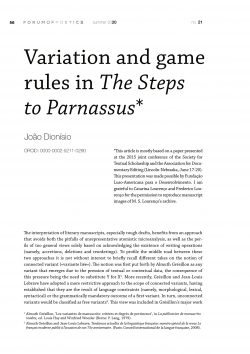
João Dionísio
A b s t r a k t
The article, inspired by Daniel Ferrer’s view of genetic variation as a process built of many interconnections, rather than a series of free operations subordinated to other operations, presents literary genesis as a game of variation. The rules of the game can only be tentatively discern by identifying its components from text and document. In the article, I devote special attention to the analysis of variations in absentia, i.e. a situation in which, although only one version of the text is written, it can be compared with a version that is closer to the reader (or more expected). Variation in absentia is essential for analyzing both textual and material aspects of the writing process (e.g. page layout changes, pen changes, replacing writing aids). In this article, I follow this kind of variation from the sketches of Os Degraus do Parnaso (The Steps to Parnas), a collection of essays by the versatile writer and analytical philosopher M.S. Lourenço (1936–2009). Accurate interpretation of textual and material constants and variables, in terms of spelling and the use of writing tools, leads to the conclusion that cases in the text (elements that, according to W.W. Greg, affect only formal presentation) are not always accidental in literary genesis.





